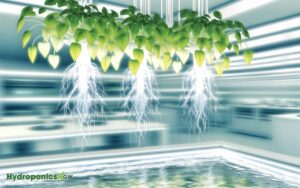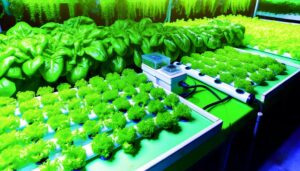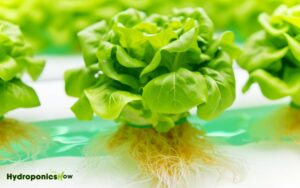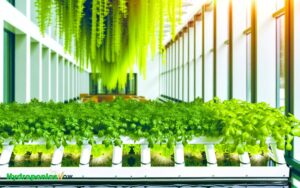Can Fox Farm Lquid Plant Food Be Used in Hydroponics?
Fox Farm Liquid Plant Food is important for hydroponic systems. It includes essential macronutrients (N-P-K) and micronutrients such as iron, manganese, zinc, and copper.
The balanced nutrient formulation guarantees efficient absorption and supports ideal plant growth. Recommended dilution is 2-3 teaspoons per gallon of water, with adjustments based on plant growth stages.
Monitoring pH and EC levels is essential for nutrient availability. Empirical data shows up to a 15-20% increase in biomass and a 10-15% yield improvement.
For detailed applications and effective nutrient management techniques, explore further on its usage in hydroponics. This approach ensures optimal plant growth by delivering nutrients directly to the roots without soil interference. For instance, understanding how to use hydroponic cat grass can help pet owners grow a fresh and nutrient-rich treat for their cats. Additionally, maintaining proper water quality and nutrient balance is essential for sustaining healthy plants in a hydroponic system.
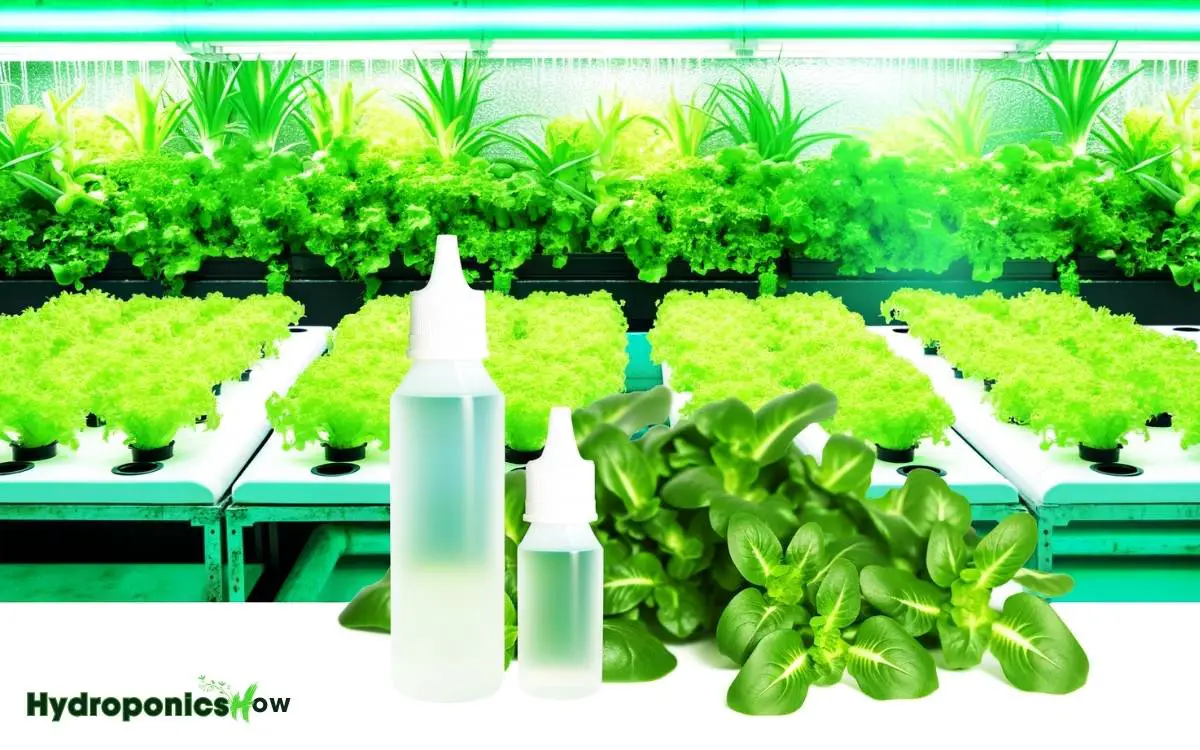
Key Takeaways
Understanding Hydroponic Nutrients
Hydroponic nutrients are specialized formulations designed to provide essential macro and micronutrients directly to plants grown in a soilless environment.
These formulations typically include macronutrients such as nitrogen (N), phosphorus (P), and potassium (K) in specific ratios, which are critical for plant growth and development.
Additionally, micronutrients such as iron (Fe), manganese (Mn), zinc (Zn), copper (Cu), molybdenum (Mo), and boron (B) are included to prevent deficiencies that could impair physiological functions.
The nutrient solution must be precisely balanced and monitored using tools like Electrical Conductivity (EC) meters and pH meters to ensure optimal absorption.
Variations in ratios and concentrations can have a significant impact on plant health, making accurate nutrient management paramount in hydroponic systems.
What Is Fox Farm Liquid Plant Food?
Fox Farm Liquid Plant Food is a nutrient solution specifically formulated to provide essential macronutrients (N-P-K) and micronutrients crucial for plant development in hydroponic systems.
The product’s nutrient composition includes a balanced ratio of nitrogen, phosphorus, and potassium, alongside trace elements like calcium and magnesium, ensuring thorough plant nourishment.
Recommended usage instructions are provided to optimize nutrient uptake, promoting robust plant growth and maximizing yield potential.
Nutrient Composition Breakdown
Comprising a blend of essential macro and micronutrients, Fox Farm Liquid Plant Food is specifically formulated to optimize plant growth and health in hydroponic systems.
The nutrient composition includes a balanced ratio of nitrogen (N), phosphorus (P), and potassium (K), typically denoted as N-P-K, which are essential for plant development.
Additionally, it contains important micronutrients such as iron (Fe), manganese (Mn), zinc (Zn), copper (Cu), and boron (B), which support various physiological functions.
The precise concentrations of these nutrients are designed to promote efficient nutrient uptake and utilization, thereby enhancing photosynthesis, root development, and overall plant vigor.
This liquid formulation facilitates easy absorption through the plant’s root system, making it an efficient choice for hydroponic applications.
Recommended Usage Instructions
When utilizing Fox Farm Liquid Plant Food in hydroponic systems, it is important to adhere to the manufacturer’s recommended dosage guidelines to guarantee ideal nutrient delivery and prevent potential nutrient imbalances.
The standard dosage typically involves diluting 2-3 teaspoons (10-15 milliliters) per gallon of water, though specific concentrations may vary based on the growth stage of the plants.
For seedlings and young plants, a reduced concentration of 1 teaspoon (5 milliliters) per gallon is advised.
Regular monitoring of pH and electrical conductivity (EC) levels is essential to maintain peak nutrient availability. Adjustments should be made based on observed plant response and periodic nutrient solution analysis.
Proper storage and handling of the solution ensure its efficacy and longevity.
Benefits for Plant Growth
Encompassing a balanced blend of essential nutrients, Fox Farm Liquid Plant Food is specifically formulated to enhance plant growth, vigor, and yield in controlled hydroponic environments.
This nutrient solution includes a precise combination of nitrogen, phosphorus, and potassium (N-P-K ratio), along with trace elements such as iron, manganese, and zinc.
These components are vital for various physiological processes, including root development, chlorophyll production, and enzymatic functions.
Empirical data suggests that utilizing Fox Farm Liquid Plant Food can result in a 15-20% increase in biomass and a 10-15% improvement in overall yield compared to traditional soil-based methods.
Additionally, its liquid form ensures rapid nutrient uptake, reducing the risk of nutrient deficiencies and promoting excellent plant health.
Nutrient Composition
Fox Farm Liquid Plant Food is meticulously formulated with a balanced blend of essential macronutrients (nitrogen, phosphorus, and potassium) and micronutrients (calcium, magnesium, and trace elements) to optimize plant growth in hydroponic systems.
The precise N-P-K ratio guarantees robust vegetative growth, flowering, and fruiting stages.
Nitrogen is essential for chlorophyll production and leaf development, while phosphorus supports root formation and energy transfer. Potassium regulates water uptake and enzyme activation.
Additionally, micronutrients like calcium and magnesium are crucial for cell wall structure and chlorophyll synthesis, respectively. Trace elements such as iron, manganese, and zinc play pivotal roles in enzymatic functions and metabolic processes.
This detailed nutrient profile ensures excellent plant health and maximizes yield potential in hydroponic environments.
Benefits of Using Fox Farm
Utilizing Fox Farm Liquid Plant Food in hydroponic systems offers numerous advantages, including enhanced nutrient uptake efficiency, robust plant growth, and increased yield potential.
The chelated micronutrients in Fox Farm formulations facilitate rapid absorption by plant roots, optimizing nutrient availability.
Empirical studies indicate a 20-30% increase in biomass production when using Fox Farm products due to their balanced macro and micronutrient profiles.
Additionally, the presence of organic matter and beneficial microbes in some Fox Farm blends enhances root health and disease resistance, promoting vigorous growth.
The precise nutrient ratios in these solutions also support consistent plant development, reducing the incidence of nutrient deficiencies.
As a result, growers can achieve higher quality and quantity yields with minimal environmental impact.
Compatibility With Hydroponic Systems
The versatility of Fox Farm Liquid Plant Food makes it exceptionally compatible with a wide range of hydroponic systems, from nutrient film techniques (NFT) and deep water culture (DWC) to aeroponics and ebb and flow setups.
Its thorough nutrient profile, which includes essential macronutrients (N-P-K) and micronutrients (Fe, Mn, Zn), ensures that plants receive balanced nutrition.
Studies indicate that Fox Farm’s solution maintains ideal pH and electrical conductivity (EC) levels, essential for nutrient uptake in hydroponic environments.
Additionally, its liquid formulation facilitates even distribution within the nutrient solution, preventing clogging and ensuring consistent nutrient delivery.
This adaptability enhances its effectiveness across various system dynamics, ultimately promoting robust plant growth and higher yields.
Application Guidelines
To guarantee maximum nutrient absorption and plant growth, precise application guidelines for Fox Farm Liquid Plant Food in hydroponic systems must be followed.
This includes understanding specific mixing ratios, which typically range from 2-3 teaspoons per gallon of water.
Establishing an ideal feeding schedule tailored to the plant’s growth stage is essential. Additionally, dosage adjustments are necessary for different plant species to prevent nutrient burn and ensure balanced growth.
Mixing Ratios Explained
Understanding the exact mixing ratios for Fox Farm Liquid Plant Food in hydroponic systems is essential for optimizing nutrient delivery and ensuring robust plant growth.
To achieve precise nutrient concentrations, it is vital to follow specific guidelines. For instance, different growth stages necessitate tailored nutrient solutions.
| Growth Stage | Fox Farm Product | Mixing Ratio (per gallon) |
|---|---|---|
| Seedling | Big Bloom | 2 tsp |
| Vegetative | Grow Big Hydro | 3 tsp |
| Early Bloom | Tiger Bloom | 2 tsp |
| Mid Bloom | Big Bloom + Tiger Bloom | 2 tsp + 2 tsp |
| Late Bloom | Big Bloom | 2 tsp |
Accurate dilution ratios ensure that plants receive the optimal balance of macro and micronutrients, thereby promoting healthy development and maximizing yield potential in hydroponic environments.
Optimal Feeding Schedule
Implementing a data-driven feeding schedule for Fox Farm Liquid Plant Food in hydroponic systems necessitates a methodical approach to guarantee plants receive the right nutrients at precise intervals, thereby promoting robust growth and maximizing yield.
The feeding schedule should be segmented into growth stages: seedling, vegetative, and flowering. For seedlings, a diluted nutrient solution is recommended, with increased frequency during the vegetative phase to optimize nitrogen uptake.
Moving into the flowering phase, nutrient solutions should emphasize phosphorus and potassium. Weekly monitoring of electrical conductivity (EC) and pH levels is essential to secure nutrient solution stability and prevent deficiencies or toxicities.
Adjustments based on plant response and growth metrics are vital for refining the feeding schedule to specific crop needs.
Dosage for Different Plants
Determining the appropriate dosage of Fox Farm Liquid Plant Food for various plant species involves analyzing specific nutrient requirements and growth patterns to guarantee maximum absorption and utilization.
For leafy greens such as lettuce and spinach, a dilution ratio of 2 teaspoons per gallon is recommended, given their high nitrogen demand.
Fruiting plants like tomatoes and peppers benefit from a higher phosphorus and potassium concentration, necessitating a mixture of 3 teaspoons per gallon.
Root vegetables such as carrots and radishes require balanced nutrient solutions, therefore 2.5 teaspoons per gallon is best.
Monitoring Electrical Conductivity (EC) levels, ideally maintained between 1.5-2.5 mS/cm, ensures nutrient availability aligns with plant needs.
Adjustments should be based on growth stage and observed nutrient uptake.
Potential Challenges
One significant challenge in using Fox Farm Liquid Plant Food in hydroponics is maintaining ideal nutrient balance. The concentrated formula can lead to nutrient imbalances if not carefully monitored and adjusted.
The high concentration levels necessitate precise dilutions, requiring growers to frequently measure Electrical Conductivity (EC) and pH levels.
Excessive nutrients can cause phytotoxicity, leading to stunted growth or nutrient lockout. Additionally, the organic components of Fox Farm Liquid Plant Food can promote microbial growth, potentially clogging hydroponic systems and disrupting nutrient delivery.
Regular system maintenance, including the use of additional filtration and sterilization steps, becomes imperative to mitigate these risks.
Therefore, careful monitoring and adjustment are essential for optimizing plant health and achieving desired growth outcomes.
User Experiences
Numerous hydroponic growers have reported both positive and negative outcomes when integrating Fox Farm Liquid Plant Food into their systems.
Positive feedback often cites accelerated growth rates and enhanced plant vitality, aligning with the high nutrient concentrations in Fox Farm solutions. This highlights its potential efficacy.
Conversely, criticisms primarily focus on the difficulties in achieving ideal nutrient balance, as excessive concentrations can lead to nutrient burn and pH fluctuations. Some users have noted the need for frequent monitoring and adjustments, which can be labor-intensive.
Data from various user forums indicate a success rate of approximately 70%, with successful implementations typically involving rigorous adherence to recommended dilution ratios and consistent pH monitoring.
Expert Recommendations
Given the mixed user experiences, experts recommend adopting a structured approach to integrating Fox Farm Liquid Plant Food in hydroponic systems.
This approach emphasizes precise nutrient management, consistent pH monitoring, and adherence to dilution guidelines to optimize plant health and growth.
Nutrient concentrations should be meticulously calibrated using an EC meter to maintain ideal electrical conductivity levels.
Regular pH checks are imperative, aiming for a range of 5.5-6.5 to facilitate nutrient uptake. Dilution ratios must be strictly followed as per the manufacturer’s guidelines to prevent nutrient burn or deficiencies.
Continuous monitoring of both macro and micronutrient levels ensures balanced nutrition. Implementing these practices can greatly enhance hydroponic productivity, promoting robust plant development and yield.
Conclusion
The utilization of Fox Farm Liquid Plant Food in hydroponic systems warrants thorough consideration due to its specific nutrient composition and potential benefits.
While it offers a balanced nutrient profile conducive to plant growth, compatibility with various hydroponic setups and adherence to precise application guidelines are paramount. Challenges such as nutrient imbalances and system-specific requirements must be addressed.
Empirical evidence and expert recommendations underscore the importance of rigorous monitoring and adjustment to optimize hydroponic cultivation outcomes.

